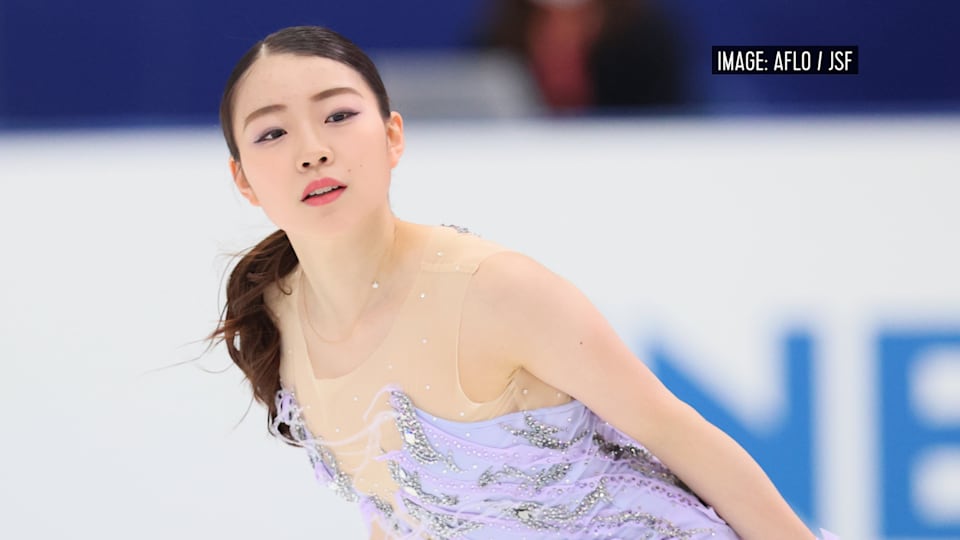
When it mattered the most, Kihira Rika brought her best skating.
The reigning Japanese national champion retained her crown, landing a quadruple Salchow for the first time in competition - as well as her patented triple Axel (though the second jump wasn't quite fully rotated) - helping her to earn a second straight title, beating a game Sakamoto Kaori, the two scoring 234.24 and 222.17, respectively.
Four-time national champion Miyahara Satoko performed outstandingly as well, placing third, at 209.75.
The three women will probably be named to the Japanese team for the World Figure Skating Championships, set for Stockholm in late March.
"I’m very happy with my performance," Kihira told Japanese TV after her victory. “I had been confident about a quad Salchow for quite some time. So I just had to do everything I had trained for. I didn’t think about being nervous, but only about how well I could jump. So I’m really happy."
Kihira's quad risk pays off
Kihira, the two-time Four Continents champion, has been talking about her quad Salchow since 2018 (see our interview above).
Having been unable to compete in this year's Grand Prix Series due to the COVID-19 pandemic, she was given the extra time to work on the jump.
She delivered it in full on Sunday (27 December), opening her free skate with it, then following it up with the triple Axel which she has displayed over the last two seasons.
The Axel was called under-rotated but - while that cost her some marks - that didn't impact the flow of the program as she moved into six more triple jumps in a program set to "Baby, God Bless You" by Shinya Kiyozuka.
Kihira coupled her impressive jumping with standout program components, scoring mostly in the nines in the artistic category and hanging with Sakamoto (74.23) and Miyahara (73.44) in that mark, at 72.62. Coupling that with her superior technical score on the day, she was the runaway victor.
"I was calmer than I'd expected. I had to land this quad Salchow successfully in order to continue the program, so it was very crucial. I felt like I had no other choice. So when I landed it, I felt it was part of my plan," an honest Kihira shared.
She continued: "In order to be able to compete at the Beijing Winter Olympics, I strongly felt I had to land a quad in this competition. I've been training very hard for this goal during the off season. So I'm really happy it led to that moment."
"Unbelievable!" said Sakamoto of Kihira's score when it came through on the TV screens backstage.
Sakamoto added: "I've just watched Rika jump [a quad Salchow]. So now I need to do the same in order to win. But if I do that and lose my sight, I know I'd make the same mistake like last year. So I just have to focus on what I need to work on now. And on top of that, I would like to add new jumps too."
"Unbelievable!" - Sakamoto Kaori on Kihira Rika's free skate
Big day for Sakamoto, Miyahara, too
While Kihira came out on top, it was also a day to remember for former national champions Sakamoto and Miyahara who both delivered knockout free skates to finish second and third respectively.
Miyahara was down in sixth after the short program but dug in in the free skate, performing at her moving, elegant best with an imaginative and difficult Tosca program.
She fell once, on the back end of a double Axel-triple toe loop combination, but it was a mere blip in an otherwise firm performance that showed the strengths of the 22-year-old who moved to Toronto to work under Lee Barkell this past year.
Finishing second, Sakamoto is using her same Matrix program from last season, clad in a futuristic black costume to match the music and – near the end of the program – skating to the edge of the rink with a dramatic kick of her blade near the judges, a statement of confidence.
She let out a massive fist pump upon completion of her free which included six triple jumps, three of them in combination.
Level four spins helped her in the artistic department, though she’ll look to clean up her jumps, including an edge call on a triple Lutz.
The Japanese contingent will look to rival team Russia at worlds, led by now three-time national champ Anna Shcherbakova and her own quad jumps. Should the Japanese want to contend for world – and Olympic – medals, they’ll need the quads to do so.
Sakamoto acknowledged as much, but it was a return to form for her after finishing sixth in last year's nationals.
